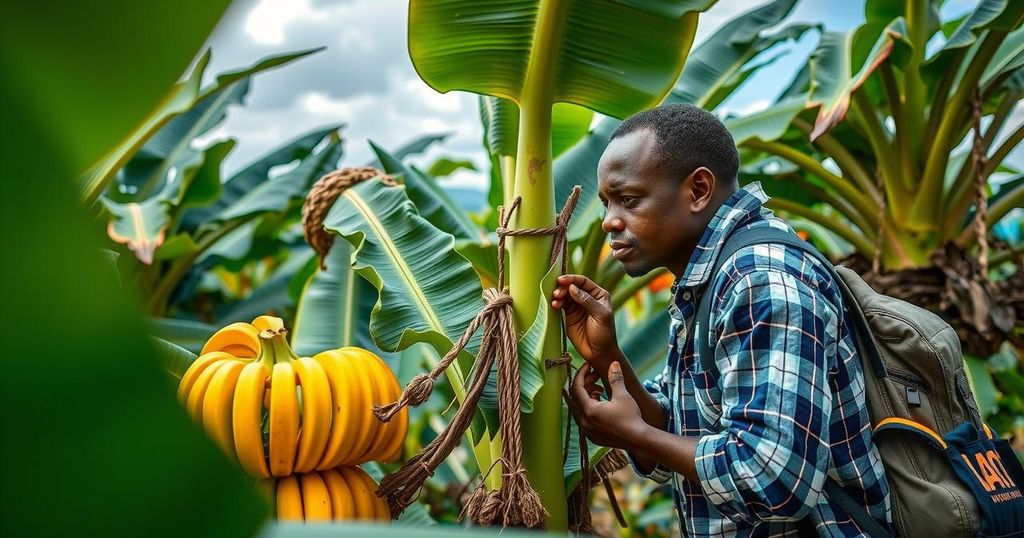In Uganda, banana farmers are increasingly threatened by extreme weather due to climate change. Justine Ahumwire’s experience with a devastating storm exemplifies this vulnerability. The NDC Action Project, in collaboration with UNEP and other organizations, is working to provide insurance and training to farmers, helping them adapt to climate impacts while ensuring their economic sustainability. As the program expands, it promises to enhance farmers’ resilience and financial security.
Under increasing climate threats, banana farmers in Uganda are finding a lifeline through innovative insurance solutions. Justine Ahumwire, a banana farmer from Shuku, faced a catastrophic storm in October that devastated her crops and livestock. This experience highlighted the vulnerability of her unprotected two-hectare farm. Due to the impacts of climate change, such unpredictable and severe weather events are becoming more common, leaving many farmers struggling with food shortages and financial instability. Recognizing the need for resilience among smallholder farmers, the NDC Action Project, a collaborative initiative led by the United Nations Environment Programme (UNEP), has sought to mitigate the effects of climate variability through improved access to crop insurance. This objective is critical, as a substantial portion of Uganda’s economy relies on bananas, with nearly half of the farming population involved in their cultivation. According to Mirey Atallah, Chief of the Adaptation and Resilience Branch within UNEP’s Climate Change Division, projects that blend technical assistance with financial resources are essential for enhancing farmers’ resilience against the climate crisis. Uganda has witnessed dramatic shifts in weather patterns over the past fifteen years, resulting in unpredictable growing seasons punctuated by extremes such as droughts and torrential rains. This instability has left farmers at risk of losing their livelihoods overnight, as characterized by Florence Muranga of the Banana Industrial Research and Development Centre. To combat these challenges, the centre has facilitated training for banana farmers on using smartphones to report damage via a digital platform, enabling prompt assessment by insurance professionals. The approach reflects an inclusive strategy, with nearly half of the initial group of trained farmers being women. Participation in this modernized insurance scheme is spearheaded by Agriculture and Climate Risk Enterprise Africa, facilitating essential connections between farmers and insurers, realized through a coalition of insurance companies known as Agro Consortium Limited. The efficiency of the digital platform minimizes the need for in-person inspections, thereby expediting claims processing and lowering insurance rates. Farmers receive training in critical areas such as water management and agroforestry, not only enhancing their productivity but also reducing potential climate-related losses, which benefits both the farmers and the insurance firms. The successful implementation of this pilot project sets the groundwork for expanding the program to benefit all 5,000 farmers associated with the Banana Industrial Research and Development Centre, with aspirations to reach 50,000 across Uganda. For individuals like Justine, this new insurance model provides a crucial safety net, significantly reducing the fear of starting over in the face of future crop failures. UNEP remains committed to addressing climate challenges globally by aligning actions with the Paris Agreement to keep temperature rises below two degrees Celsius. Its Sectoral Solution aims at reducing emissions across vital sectors, thus contributing to climate stabilization initiatives.
The article elaborates on the impacts of climate change on Ugandan banana farmers and highlights an innovative insurance scheme being developed to protect them from extreme weather events. It illustrates the struggles faced by farmers, such as Justine Ahumwire, who recently suffered significant losses due to an unpredictable storm. By partnering with organizations like UNEP and utilizing modern technologies, these farmers are receiving training and resources to access insurance that will help shield them from future disasters. The initiative not only aims to enhance agricultural resilience but also focuses on broader climate change mitigation strategies.
In summary, innovative insurance solutions are emerging as vital lifelines for Ugandan banana farmers facing the increasing threats of climate change. Through modern technology and strategic partnerships, projects spearheaded by UNEP and other organizations offer essential support, fostering resilience and financial security among smallholder farmers. As these efforts expand, they hold the promise of safeguarding livelihoods against the ever-changing climate while contributing to broader climate stability objectives.
Original Source: www.unenvironment.org






